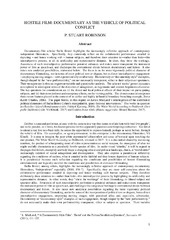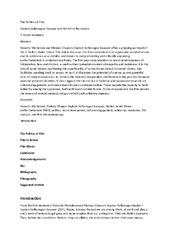Blar i forfatter Artikler, rapporter og annet (samfunnsvitenskap) "Robinson, P. Stuart"
-
Hostile Film: Documentary as The Vehicle of Political Conflict
Robinson, P. Stuart (Chapter; Bokkapittel, 2023)Documentary-film scholar Stella Bruzzi highlights the increasingly reflexive approach of contemporary independent filmmakers. Specifically, they commonly reflect on the collaborative performance entailed in depicting – and hence working <i>with</i> – human subjects, and therefore draw attention to—rather than hide—this intersubjective process, in all its artificiality and representative distance. ... -
The Politics of Film: 'Captain Volkonogov Escaped' and the Art of Resistance
Robinson, P. Stuart (Journal article; Tidsskriftartikkel; Peer reviewed, 2023-10-05)Natasha Merkulova and Aleksey Chupov's Captain Volkonogov Escaped offers a gripping portrayal of life in Stalin's Soviet Union. This article discusses the film's evocation of an oppressive social structure and its pertinence as a stimulus and means to comprehending and critically appraising authoritarianism in contemporary times. The film pays close attention to micro-level dynamics of intimidation, ... -
Refugees on Film: Assessing the Political Strengths and Weaknesses of the Documentary Style
Robinson, P. Stuart (Journal article; Tidsskriftartikkel; Peer reviewed, 2019)The article considers one dominant tendency of independent filmmaking, and its impact on the treatment of the refugee (broadly conceived): the application of contemporary documentary methods to both fiction and nonfiction works. The goal is a preliminary exploration of the complex, context-sensitive political effects of the approach, sometimes dubbed the “documentary style”, as resistance of ... -
Tamed Monsters and Human Problems in Cinema's Interview with the Vampire (1994)
Robinson, P. Stuart (Journal article; Tidsskriftartikkel; Peer reviewed, 2019-11-11)What can the taming of the monster reveal about its construction and the potential and limits of change? Modernist, individualist qualities of Western culture and society have shaped the construction and deconstruction of the monster in popular culture in general and film in particular. The idea of an historically emergent human nature and its associated norms is key to the construction of the monster ...


 English
English norsk
norsk


